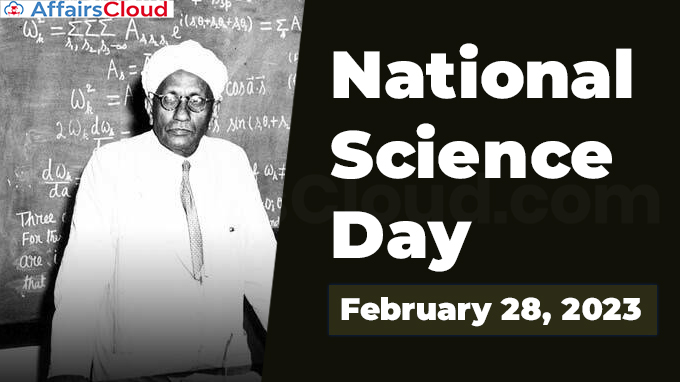 National Science Day (NSD) is annually observed across India on February 28 in commemoration of the discovery of the Raman Effect (28th February 1928) by the Indian scientist Sir Chandrasekhara Venkata Raman (CV Raman).
National Science Day (NSD) is annually observed across India on February 28 in commemoration of the discovery of the Raman Effect (28th February 1928) by the Indian scientist Sir Chandrasekhara Venkata Raman (CV Raman).
- CV Raman was awarded the Nobel Prize in Physics (1930) for his work on the scattering of light and for the discovery of the effect named after him, the Raman Effect.
National Science Day 2023 is observed on 28th February 2023 under the theme “Global Science for Global Wellbeing”.
- On 10th January 2023, the theme for NSD 2023 was unveiled by Dr Jitendra Singh, Union Minister of State (Independent Charge) Science & Technology.
Objective:
The main objective of NSD is to raise public awareness of the value of science in daily life and to encourage people by making science and technology more accessible.
Background:
i. In 1986, the National Council for Science and Technology Communication (NCSTC) proposed that February 28 be observed as National Science Day to the Government of India.
- The Government of India proclaimed to observe February 28 of every year as National Science Day
ii. The 1st ever National Science Day was observed on 28th February 1987.
Key Points:
i. The NCSTC, under the Department of Science and Technology (DST), Ministry of Science and Technology, acts as a nodal agency to support, catalyse, and coordinate the celebration of the NSD across India.
ii. NCSTC, supports various programmes across India for the organisation of lectures, quizzes, open houses, etc, through the State Science & Technology (S&T) Councils & Departments.
Awards:
the National Awards for Science Popularization and SERB Women Excellence Award are annually presented on the occasion of National Science Day.
i. The DST established the National Awards for Science Popularisation in February 1987 to recognise contributions to science through awards.
ii. SERB Women Excellence Award was launched by the Science & Engineering Research Board (SERB), a statutory body of the DST supporting basic research in frontier areas of science and engineering.
- Women scientists under 40 who have achieved awards from one or more National Academies, such as the Young Medal and Young Associateship, are recognised with the SERB award.
AWSAR Awards 2022:
Augmenting Writing Skills for Articulating Research (AWSAR) award, an initiative of the DST, seeks to recognise the dissemination of Indian Research in Science, Technology, and Innovation carried out by PhD researchers and Post-Doctoral Fellows in the form of popular science writing.
- AWSAR Awards will be bestowed annually on 28 February at the NSD event.
- All the awardees will be given an opportunity to attend Science Film Training Workshop organised by Vigyan Prasar.
Click here for the winners of the AWSAR Award 2022
About Sir Chandrasekhara Venkata Raman:
i. Sir CV Raman was born on 7th November 1888 in Tiruchirappalli, Tamil Nadu, and passed away on 21st November 1970 in Bengaluru, Karnataka.
ii. He became a professor of Physics at the University of Calcutta in 1917 and was elected as a fellow of the Royal Society in 1924.
iii. In 1933, CV Raman became the 1st Director of the Indian Institute of Science.
iv. He established the Raman Research Institute on property donated by the Government of Mysore in Bengaluru, Karnataka, in 1948.
Awards and Honours:
i. In 1929, King George V of Great Britain knighted him and titles him, Sir CV Raman.
ii. He received Nobel Prize in Physics in 1930 for his discovery of the Raman Effect and for his work on the scattering of light.
iii. In 1954, the Government of India honoured him with the Bharat Ratna for his contribution to Science and Engineering along with Sarvapalli Radhakrishnan and Chakravarti Rajagopalachari.




